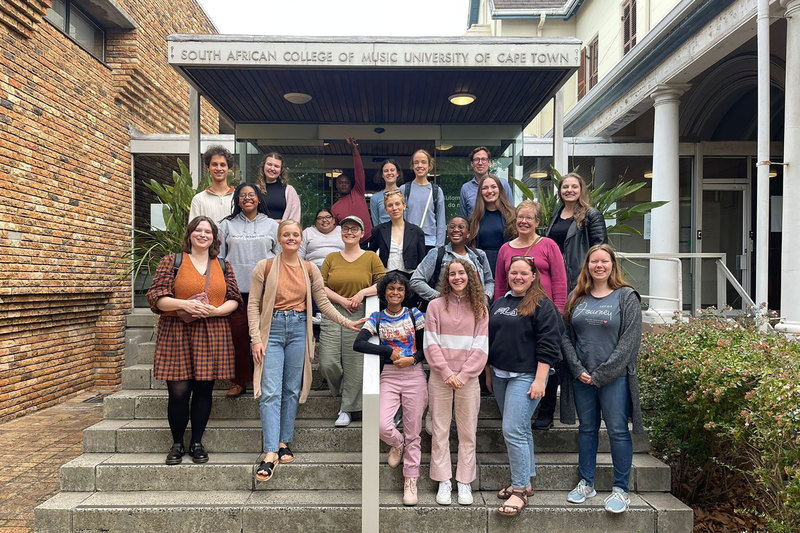New 3D virtual exhibition explores the relations between music and identity
24 October 2023 | Story Farah Khalfe. Photo Supplied. Read time 5 min.
As part of a collaborative seminar between the Musicology Department Detmold/Paderborn and the South African College of Music (SACM) at the University of Cape Town (UCT), students from the respected institutions explored the relations between music and identity.
Our identities are constructed through multiple factors: class, gender, age or ethnicity make up who we are, but the same holds true for our musical preferences. Do we listen to certain music to belong to a group or do our communities influence what we choose to listen to and engage with? These are some of the questions addressed by the students of the Musicology Department Detmold/Paderborn and the SACM at UCT.
With the concept of “identity” underpinned by four major topics: class, colonialism, gender, and religion, the students developed research questions, and presented their findings at a conference at the SACM in April this year.
These findings are now being made accessible to the public through the medium of a 3D virtual exhibition, titled Music and Identity.
On Thursday, 19 October, the exhibition was launched with an insightful guided tour and Q&A session with the curators.
“Identity can be used to liberate and oppress, just as its expression in music can be used to include and exclude.”
Assembled by a group of 21 curators, the exhibition includes a selection of creative, intellectual, and informative works that speak to the notion of music in identity. Nuanced accounts by South African and German musical figures and artistic expression by female creatives bring this research to life in a thought-provoking and visually appealing way.
“We listen to and make music in order to belong to a specific group, but also to express a certain attitude in relation to the society around us,” reads and excerpt of Music and Identity – An Introduction.
“Identities are not stable, just as our listening preferences change over time. In addition, identity can be used to liberate and oppress, just as its expression in music can be used to include and exclude.”
The exhibition is divided into four sections, as per the four topics of identity.
Gender
In this section, the students focus on “Rejection vs Validation” in communities, music, Africa, and Europe. They present this assumption by showcasing four prominent historical female composers: Charlotte Maxeke and Miriam Makeba from Africa, and Ethyl Smyth and Fanny Hensel from Europe. The curators compare the works of these women under the aspect of “Rejection vs Validation”, as well as through their careers as women musicians on different continents.
On the life and work of Makeba, an excerpt from the exhibition reads: “Her work reduced the representation of white women and men on stage and highlighted the importance of representation for Africans and the restructuring of power relations. She was aware that her voice could be a weapon to challenge political oppression.”
The argument of “Rejection vs Validation” is further developed by interviews with two contemporary female composers, Meryl van Noie and Farzia Fallah, who chat about the concept in the music industry today; as well as by the works of prominent female visual artists from South Africa and Germany, which reflect how the topic manifests within their communities.
Colonialism
The exhibition looks at colonialism as a vehicle for the development of music across cultures, continents, and genres. The students do this by exploring the productions of large media conglomerate, Disney, and how cultures are portrayed through their animation and music. The historical backgrounds of popular films Pocahontas and The Lion King are discussed, highlighting issues of misrepresentation and cultural appropriation, and sparking conversations on how exposure to such films impact the psychology of developing children.
Class
This section, titled “Who am I? Who are we? Who are they?” explores the ways in which music, class, and identity are intertwined. Issues such as “the impact of class on the development of musical identities”, and “how class struggles affect the evolution of musical genres”, are considered. The students examine these questions through the lens of classical music, South African music, and jazz.
Religion
The connection between music, identity and religion is complex. To research this topic, the students reached out to different churches from three denominations in Cape Town to gather information on the importance, effect, and perception of music in their church service. The exhibition showcases a conclusion on how music impacts both personal and religious identity.
Through the research, insights, and personal accounts presented in Music and Identity, the exhibition seeks to enlighten, educate, and spark new discussions around the multi-layered relationship between music and the multiple facets that make up identity.
The project was completed through the support of the German Academic Exchange Service (DAAD), and the Federal Ministry of Education and Research within the IVAC programme.
Music and Identity runs from 19 October to 31 December.
 This work is licensed under a Creative Commons Attribution-NoDerivatives 4.0 International License.
This work is licensed under a Creative Commons Attribution-NoDerivatives 4.0 International License.
Please view the republishing articles page for more information.










